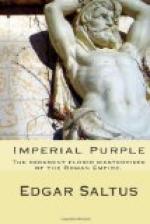A little before, rumor reached him that a group of the citizens of Alexandria had referred to him as a fratricide. After the adventure in Parthia he bethought him of the city which Alexander had founded, and of the temple of Serapis that was there. He wished to honor both, he declared, and presently he was at the gates. The people were enchanted; the avenues were strewn with flowers, lined with musicians. There were illuminations, festivals, sacrifices, torrents of perfumes, and through it all Caracalla passed, a legion at his heels. To see him, to participate in the succession of prodigalities, the surrounding country flocked there too. In recognition of the courtesy with which he was received, Caracalla gave a banquet to the magnates and the clergy. Before his guests could leave him they were killed. Through the streets the legion was at work. Alexandria was turned into a cemetery. Herodian states that the carnage was so great that the Nile was red to its mouth.
In Rome at that time was a prefect, Macrin by name, who had dreamed the purple would be his. He was a swarthy liar, and his promises were such that the pretorians were willing that the dream should come true. Emissaries were despatched, and Caracalla was stabbed. In his luggage poison was found to the value of five million five hundred thousand drachmae. What fresh turpitude he was devising no one knew, and the discovery might serve as an epitaph, were it not that by his legions he was adored. No one had abandoned to the army such booty as he.
Meanwhile, in a chapel at Emissa, a boy was dancing indolently to the kiss of flutes. A handful of Caracalla’s soldiers passed that way, and thought him Bacchus. In his face was the enigmatic beauty of gods and girls—the charm of the dissolute and the wayward heightened by the divine. On his head was a diadem; his frail tunic was of purple and gold, but the sleeves, after the Phoenician fashion, were wide, and he was shod with a thin white leather that reached to the thighs. He was fourteen, and priest of the Sun. The chapel was roomy and rich. There was no statue—a black phallus merely, which had fallen from above, and on which, if you looked closely, you could see the image of Elagabal, the Sun.
The rumor of his beauty brought other soldiers that way, and the lad, feeling that Rome was there, ceased to dance, strolling through pauses of the worship, a troop of galli at his heels, surveying the intruders with querulous, feminine eyes.
Presently a whisper filtered that the lad was Caracalla’s son. There were centurions there that remembered Semiamire, the lad’s mother, very well; they had often seen her, a superb creature with scorching eyes, before whom fire had been carried as though she were empress. It was she who had put it beyond Caracalla’s power to violate that vestal when he tried. She was his cousin; her life had been passed at court; it was Macrin who had exiled her.




